Today, Oct. 11th, is National Coming Out Day in the U.S. (It’s tomorrow, the 12th, in the United Kingdom). Rob Eichberg and Jean O’Leary, who began National Coming Out Day in 1988, encouraged all people, of all sexual orientations, to “take your next step” in living openly and powerfully.
A lot has happened since that first Coming Out Day. Many college campuses have pride groups that have made it a huge event. They offer support to people in all stages of coming out, and encourage those still in the beginning of the process by telling them that they are not alone.
In researching creating this web comic, I found several sources, some of which overlapped:
- Stages of Coming Out – Coming Out as Lesbian, Gay, Bisexual
- Whether you come out or not, you’re still gay!
- Stages of Coming Out
- The Stages of Coming Out
- Stages in Coming Out
- 18 Things To Consider Before Coming Out
I stuck primarily with the top link, but did branch out a few times. I take no political stance with this, and any views you’ll find elsewhere on those sites are not mine.
So, without further ado, enjoy!
I discovered through research (and personal experience) that these stages can be experienced in this general order, but can be experienced multiple times and in different orders. Thus, I did not put them in a numbered order.
—-
The comic is in jest, but this stage can be painful. From EmptyClosets:
At the beginning of every person’s coming out process is a period where that person begins to question his or hers heterosexual identity. This typically happens when a person realizes that he/she is attracted to members of the same sex. They begin to ask themselves the question, “Am I really straight?” It takes some people years to answer that question, where others take less time. Most people are shocked and scared to think that they are not be straight and, therefore, many people deny that they might be lesbian, gay or bisexual. Some people never move on from this stage and live their lives as heterosexuals.
—-
Most of the resources agreed that this stage is marked by loneliness. More questions come: “Am I really gay? What would that mean? What does being gay look/feel like?”
—-
The individual begins to come to terms with who he or she is, but might not fully identify with a label, if at all.
—-
From Psychpage.com:
This stage entails feeling good about oneself, seeking out positive relationships with other gays or lesbians, and feeling satisfied and fulfilled.
—-
This. Is. Terrifying. But hopefully, it will be only because of your fears and not because of how people react. The reactions can span the spectrum from anger and disbelief to total acceptance. You might be surprised as to who is accepting and who is shocked.
From EmptyClosets:
If you feel that you are currently in this stage, do not feel obligated to come out to everyone yet. Take your time and think before you tell. Throughout your coming out process some people will take the news well and some will take it harshly. During the first few stages of coming out harsh reactions to your news will hurt worse than if you waited until later. Again, this site is just a set of general guidelines. It is important that you listen to your intuition and only do what feels comfortable to you. Play it safe, but be sure to find support somehow.
—-
With the sense of shame gone, the individual will approach what makes him or her different with a sense of pride. Some will be taken aback by this new sense of confidence in the individual and accuse him or her of being “militant.”
From EmptyClosets:
You will most likely be less shy about your sexuality… You will begin to feel more comfortable talking about your sexuality and will most likely come out to more of your friends. In this stage you will also begin to meet and become friends with other lesbians, gays and bisexuals. You will most likely begin to explore gay and lesbian culture by visiting bars, clubs and other hangouts.
In most of these later stages, the resources mention the continued importance of gay, lesbian, bisexual or transgender people seeking comfort in others like them.
—-
From Psychology Today:
At this stage of integration, the “them and us” concept breaks down. Gays and lesbians begin to understand that not all heterosexuals are homophobes.
Although, that understanding can from in earlier stages.
After a while, you’ll think of yourself as being more than just LGBT. From About.com:
You might have a more holistic view of yourself and feel equally comfortable in straight and GLBT environments. Your identity is integrated with all aspects of yourself.
The process won’t completely end, as your life’s cast of characters is never static. From EmptyClosets:
In this stage, being lesbian, gay or bisexual becomes just another part of who you are. There will always be new people in your life that you will have to come out to, so in a sense the process of coming out never really ends. However, in this final stage coming out becomes less of an issue and more of a part of life.
These steps only scratch at some of the emotions and situations experienced when coming out. Each person does it differently, and in different orders. Most of these resources all say that there’s no “right way” to do it. So, if you’re beginning your process or further along in your “coming out” journey, these are just fluid guidelines.


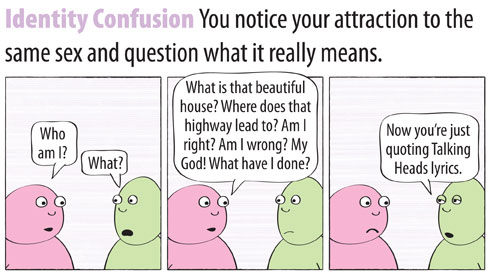
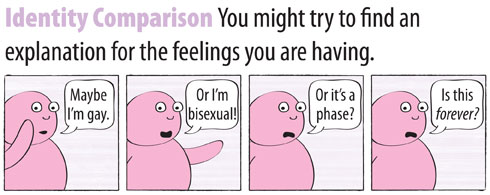
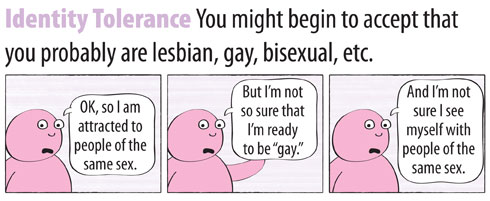
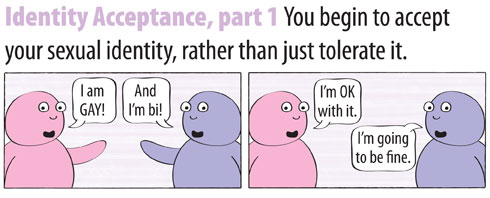
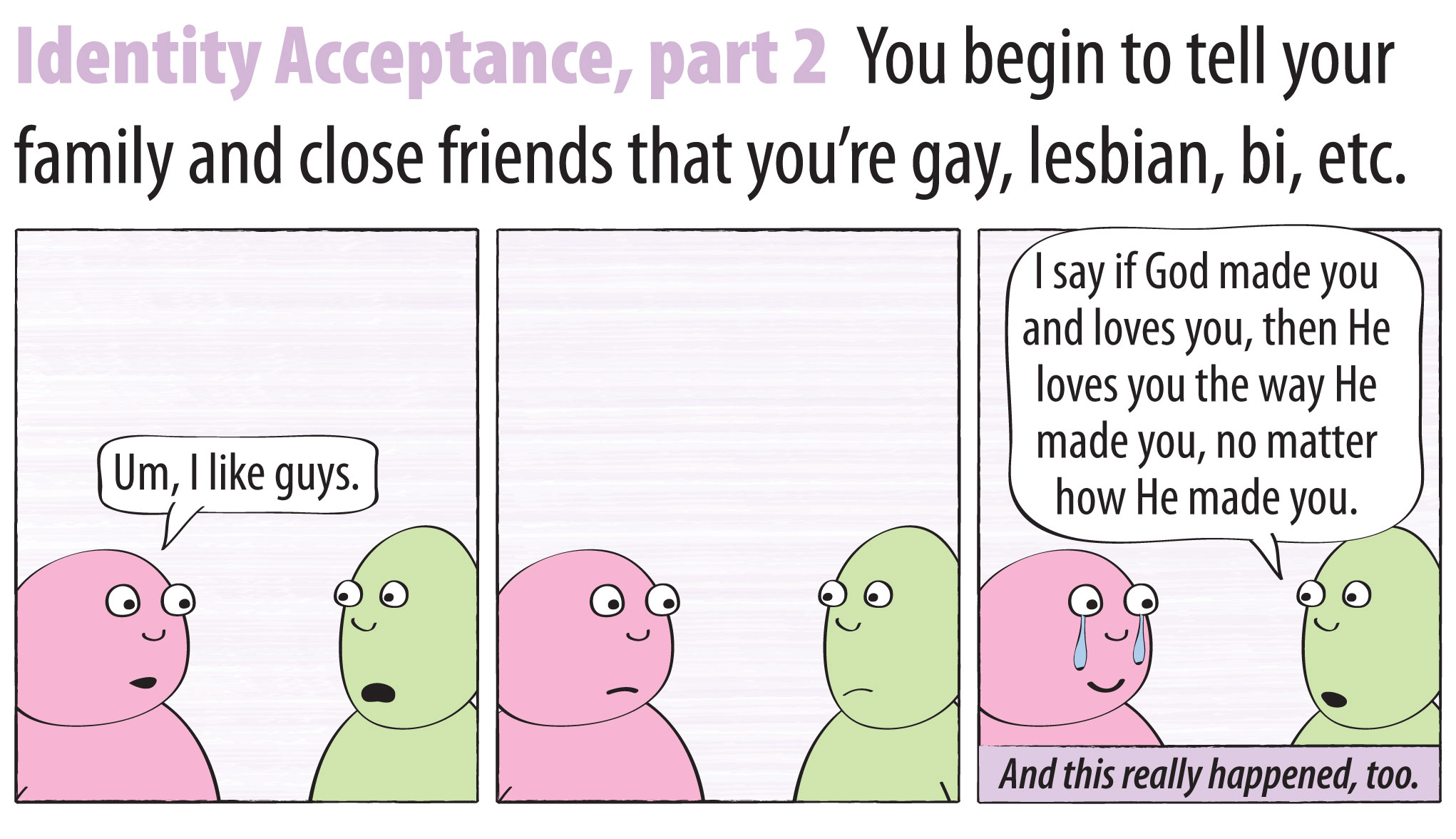
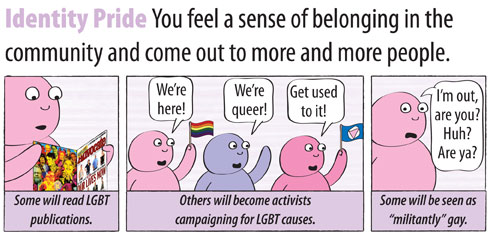
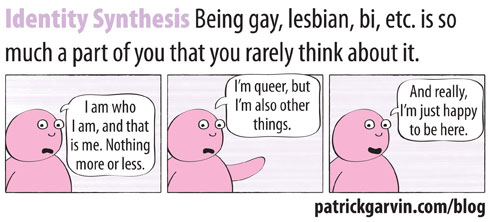
I Heart You!
Pingback: Tweets that mention Patrick Garvin: Blog» Blog Archive » Web Comic: The Stages of Coming Out -- Topsy.com
What a great posting. I wish every kid who is struggling with their sexual identity could read this. Thank you Patrick for writing this. I hope lots of people read it.